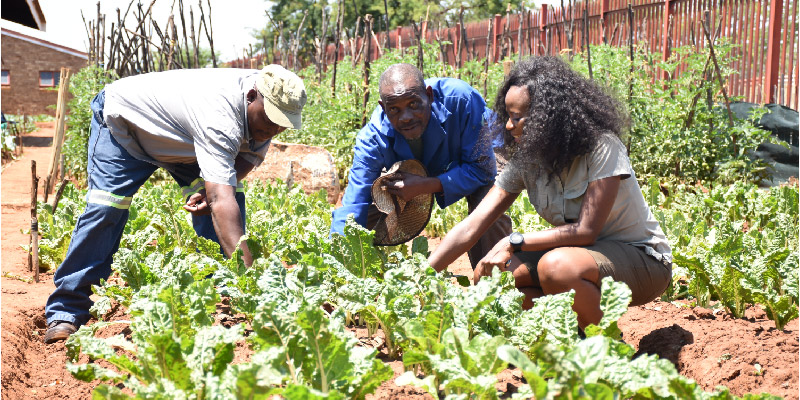 ×
×
Stimulating Change through CSI
About Land Bank
The Bank’s objective is to serve South Africa’s commercial and emerging farmers by bringing specially designed financial services within their reach. These services enable farmers to finance land, equipment, improve assets and obtain production credit.
Land Bank’s vision is to be a world-class agricultural development bank that stimulates growth, drives solid performance, and spurs innovation. The vision is realized through the quest to work with all stakeholders in building an adaptive and competitive agricultural sector that drives environmental, social, economic growth and development, thus contributing to food security.
Land Bank CSI
Land bank’s aim with CSI is to compliment the bank's mandate to build an adaptive and competitive agricultural sector that drives environmental, social and economic development, thus contributes to food security, through investing in improving the quality of life of disadvantaged communities.
Our approach is developmental in nature and we believe in long-term investment in order to have sustainable development impact with selected projects.
Our focus is on promoting the development of agricultural expertise to enhance employment quality and facilitating the development of emerging and subsistence farmers to promote food security. In this way, we seek to grow the sector and contribute towards its transformation.
Project Introduction
Land Bank established a working relationship with community-based nutrition and HIVAIDS organisations to support the implementation of the Sustainable School Food Garden and Nutrition Education (SSFGNE) project within Nokeng tsa Taemane Municipality, in Cullinan. The focus area of the programme is the farming community and mining area of Refilwe and Onverwacht in the five schools of Chokoe Primary School, Sedibeng Primary School, Chipa-Tabane High School, Onverwacht Primary School, and Protem Zonderwater Prison School.
The SSFGNE project was informed against the backdrop of several studies conducted in South Africa, which confirmed that, malnutrition rates are high and school attendance rates are low within rural and farming schools and communities. Among the children that attend school, many arrive to school hungry, and for most, their only significant meal of the day is the lunch they receive through the school feeding scheme programme. As a result, their ability to learn and achieve great results is compromised. The theme of the project is to provide a Healthy Meal to enable Healthy Minds and Productive learners.
Additionally, the project is designed to strengthen the ability of families and communities to support the development of healthy, nourished educated children, thereby increasing the potential of improved nutrition and food security opportunities. As a result, the strategy of the programme is to provide rural and farming communities with the knowledge and resources to begin addressing key health, social and economic challenges in a much more integrated way. This was undertaken and implemented through engagement with various stakeholders namely principals, educators, food-handlers, School Governing Body members and community members. None of the selected schools and communities had an existing food garden nor involved in any current agricultural activity.
Why Food Gardens and Nutrition Education?
A programme of this nature assists in increasing the amount of fresh vegetables available for schools lunches through the establishment of school gardens, in addition the improvement of the nutrition and health status of the Children in project schools is a key focus for the Bank. Increasing the knowledge of gardening and nutrition topics among learners, educators, school food handlers and parents through a Agriseta qualification is also a priority for the bank as a stepping stone stone towards transformation and increasing food security for our country.
What has been achieved to date
• All participating schools have established vegetable gardens and these are currently being expanded. Produce is included in school lunches at least once a week.
• 15% of pupils are still underweight or at risk of being underweight. Height and weight measurement will be redone in June 2019.
• Educators did not achieve 75% and the average score for children was 60%. Additional training is currently underway and all participants will receive certificates on completion of all training credits in 2019.
• Integration of the food garden programme into the school curriculum and into classroom activity is still a challenge. However, green clubs (agri youth clubs) have been established in all participating schools and fresh produce is being used in school menus at all schools.
Community Change
The ultimate goal of Sustainable Food Garden and Nutrition Education Programme is to enact community-wide change. The programme sees learners as “change agents” who have the ability to bring about real change in their homes and community. The learners are encouraged to take information home to share information with their parents, peers, guardians, families and neighbours about hygiene, nutrition and gardening. In addition, the learners also encourage parents working at the gardens to establish a backyard garden at home.